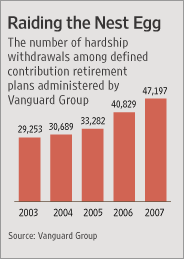
Americans are tapping their retirement funds at a quickening pace, the Wall Street Journal reports.
Comprising of both "hardship withdrawals" and standard 401(k) loans, the retirement fund distributions are serving multiple purposes:
Raise immediate cash to avoid home foreclosure
Access funds to weather higher "life costs"
Make larger downpayments on a home purchase
None of these are bad reasons to withdraw retirement funds, per se, but it's important to consider how a distribution can impact your long-term financial goals.
To get the full picture, let's review how a 401(k) loan works, what some of the pros and cons of a 401(k) loan are, and then take a deeper look at the math.
First, the make-up of a 401(k) loans:
You make a formal request to your company's plan administator
You may borrow to up to 50 percent of your 401(k) balance, up to $50,000
You must repay your loan with interest, usually at (Prime + 1.000) percent
Repayments are deducted from your paycheck directly
Repayment terms are 60 months, but you may repay the loan faster
The process of applying for the 401(k) may take days or weeks, depending on the speed of your benefits administrator but, by most accounts, it's an easier process than applying for a bank loan.
401(k) loans are simpler than bank loans because it's a request for your own money -- there's no need for a credit check, there's a lot less paperwork, and there are countless approvable reasons for a withdrawal. And, because the loan is repaid with interest, there is a measurable return.
But that's where the positives end.
As for the negatives, we can sum them up pretty easily:
You fund a 401(k) plan using pre-tax dollars
You repay a 401(k) loan using post-tax dollars
In other words, every $1,000 borrowed earns $60 in interest but costs $1,388 to pay back.

And then, when the funds are withdrawn "legally" at retirement age, the same dollars get taxed a second time.
There are other negatives, too, including plan administrator loan fees and the impact of losing long-term compounded interest on your portfolio, but it's the double-taxation issue that can really derail a retirement plan.
In addition, if the economic hardship continues and a 401(k) loan defaults, the IRS then assesses a 10 percent tax penalty on the withdrawal amount.
Now, this isn't to say that 401(k) loans are bad -- just that they may not be right for you. There are a bevy of financial emergencies that call for 401(k) loans to be made, but it makes sense to talk with a qualified financial professional before taking the first step.
Sure, you're "paying interest to yourself", but you're paying a lot more taxes to the IRS.
401(k) loans are financial obligations that deserve critical analysis from a professional. If you don't know one, please ask me for a referral in your area. It's worth 30 minutes of your time to check out your option.

0 comments:
Post a Comment